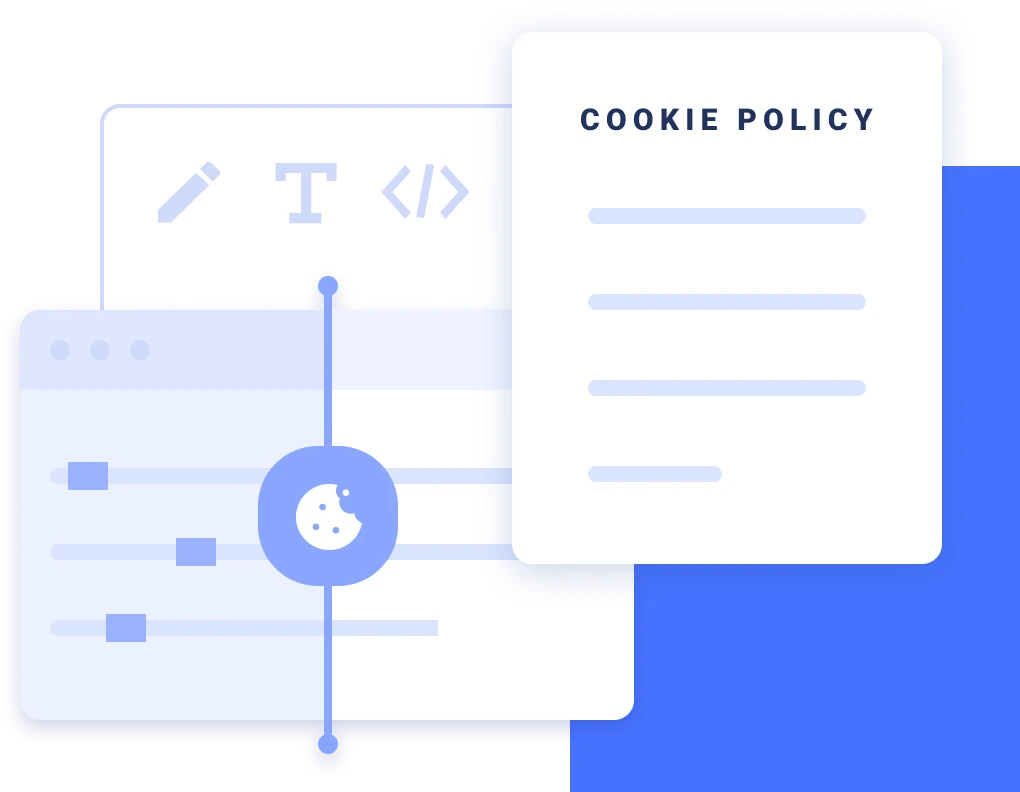Yes, the cookie policy generator is free. You can use the website scan tool, create a consent banner, add a preference center, and publish a cookie policy for free with the Basic plan.

Create a free cookie policy for your website in just a few steps with our cookie policy generator. Comply with data privacy laws while building trust with your website visitors by publishing a cookie policy for FREE!

“It is so easy to use. I don't need to understand the full legal details of everything. It takes you step by step through the whole process.”

“I highly recommend Termly for anyone navigating the new era of online privacy. They make it easy, affordable, and most importantly, compliant!”

“I appreciated how quickly I was able to reach customer support. The person was very helpful in getting me the information I needed to present internally so I could sign us up for Termly!”

Scan your site using our website scanner.
Choose your method of dispute resolution
Give a few final details and add additional customization if needed
Done!

Your website may be using cookies that you don’t even know about. We help you discover, categorize, and block these cookies in compliance with regulations. – Yasmeen, Privacy Engineer @ Termly
Our online scanner will first search every page of your site for cookies, automatically categorize them, and compile a list of each cookie and its details for you to review. We will automatically find and categorize your cookies into six types of cookies:
Blocking cookies is an essential part of complying with cookie legislation like the GDPR. You are required to block cookies until your website visitors give you consent. Our tool will automatically block third-party cookies and scripts for you until a user has consented to them.

Your website may be using cookies that you don’t even know about. We help you discover, categorize, and block these cookies in compliance with regulations. – Yasmeen, Privacy Engineer @ Termly
Our cookie policy generator will customize your policy with the results of your website scan. Simply review the classifications, auto block any cookies you want, and make any additional edits as necessary.
You will be able to add your new cookie policy to your website using one of three embed options:
We will also add a link to your cookie policy in your customizable user consent banner, which we automatically generate.
Our legal team reviews and updates our generators on a regular basis. When cookie regulations change or new laws are enacted, we evaluate and update our generators to make sure you stay compliant. Your cookie policy can be automatically updated to reflect these changes.
Our cookie policy generator helps you comply with cookie regulations worldwide, including the General Data Protection Regulation (GDPR), ePrivacy Directive (EU Cookie Law), and the California Consumer Privacy Act (CCPA).
Our cookie policy generator comes with access to our comprehensive cookie consent manager, which allows you to create a customized cookie use and preference banner, implement cookie blocking, manage user consent, embed a preference center, and more.
Being fully compliant requires you to have more than just a cookie policy. You will also need to give your visitors a way to request info about their personal data, submit a data deletion request, and more.
We provide you with an embeddable Data Subject Access Request (DSAR) form and a “Do Not Sell or Share My Personal Information” link that you can add to your website with ease.
Cookies are small data files that are placed on a user’s computer or mobile device when they visit a website. They can be used to track user behavior, remember user preferences or settings, improve user experience, and more.
If you use cookies and are subject to any laws that regulate cookie use (e.g., the EU cookie law, CCPA, GDPR, etc.), you must publish information about the cookies you use. This information needs to be present in a cookie policy or privacy policy.
You should display your cookie policy where your users can easily access it. If you use our consent banner, your policy will automatically be added as a link. You can also add a cookie preference center link to your banner.

Most websites will need to comply with certain cookie regulations. A comprehensive and easily accessible cookie policy keeps you out of trouble. – Leila, Privacy Compliance Specialist @ Termly
We answer the most frequently asked questions we get about cookie policies
and why our cookie policy generator is the best.

Your cookie policy will comply with the latest regulations thanks to the collaboration between our engineers and expert legal department. – Jona, Director of Product @ Termly
Create a compliant privacy policy that outlines your data collection practices
Learn more
Establish guidelines and safeguard your business with custom terms
Learn more
Create a managed consent solution to protect your blog, website, or app
Learn more
Generate a compliant and automatically updated End-user License Agreement
Learn more
June 30, 2025
Ali Talip Pınarbaşı, CIPP/E, & LLM
June 30, 2025
Ali Talip Pınarbaşı, CIPP/E, & LLM
June 30, 2025
Ali Talip Pınarbaşı, CIPP/E, & LLM
June 30, 2025
Ali Talip Pınarbaşı, CIPP/E, & LLM
June 30, 2025
Ali Talip Pınarbaşı, CIPP/E, & LLM
June 30, 2025
Ali Talip Pınarbaşı, CIPP/E, & LLM
June 30, 2025
Ali Talip Pınarbaşı, CIPP/E, & LLM
June 30, 2025
Ali Talip Pınarbaşı, CIPP/E, & LLM
June 30, 2025
Ali Talip Pınarbaşı, CIPP/E, & LLM